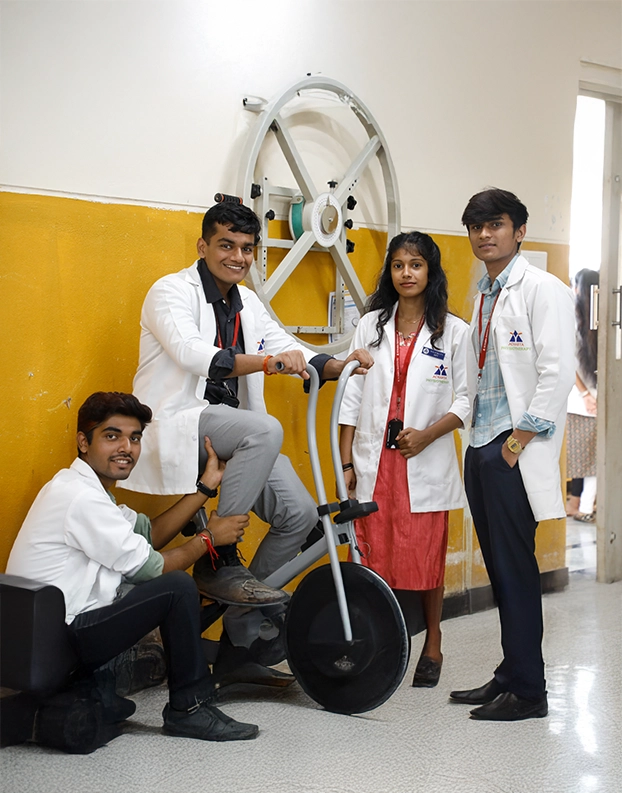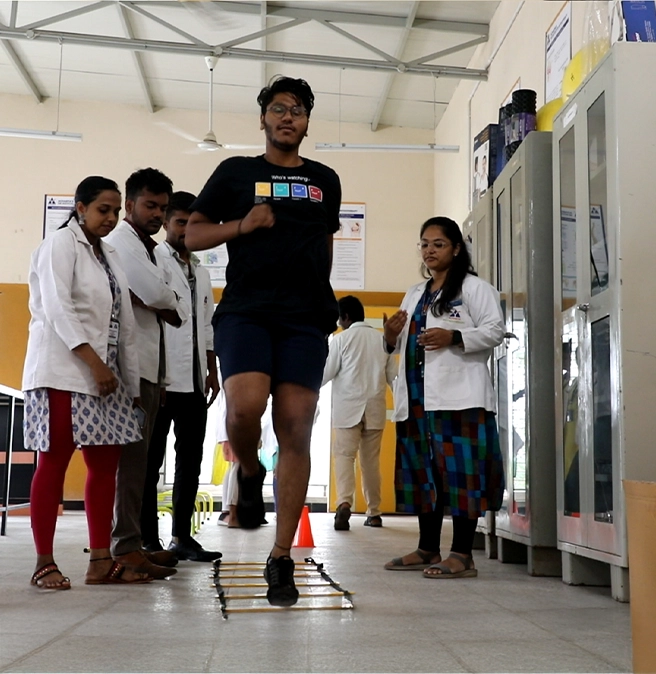Best Musculoskeletal Science Colleges in Bangalore - Acharya
Master of Physiotherapy (MPT) in Musculoskeletal Sciences is an advanced degree program designed to equip physiotherapists with specialized knowledge and clinical skills to treat musculoskeletal disorders. This program is ideal for those who wish to deepen their expertise in managing conditions related to bones, joints, muscles, and soft tissues.
Program Highlights:
-
1) Comprehensive Study of Musculoskeletal Anatomy, Biomechanics, and Pathology
- Anatomy and Biomechanics: The program delves deep into the detailed study of the musculoskeletal system, including the structure and function of bones, muscles, joints, and soft tissues. Students learn about normal and pathological movement patterns and how these contribute to injury and dysfunction.
- Physiology and Pathology: Understanding the physiological processes of healing and the pathological mechanisms of musculoskeletal diseases (e.g., arthritis, osteoporosis, and tendonitis) is crucial for accurate diagnosis and treatment planning.
- Clinical Examination: Students are trained to perform comprehensive assessments using advanced techniques, including postural analysis, joint mobility testing, muscle strength evaluation, and special tests for musculoskeletal disorders.
- Diagnostic Tools: Alongside traditional assessment methods, students also learn to incorporate modern diagnostic tools like imaging (X-rays, MRI) and diagnostic ultrasound to better understand the nature of musculoskeletal injuries or diseases.
- Manual Therapy: A significant component of the program includes advanced manual therapy techniques such as joint mobilization, manipulation, soft tissue mobilization, and myofascial release. These techniques help reduce pain, improve mobility, and restore normal function in musculoskeletal conditions.
- Exercise Prescription: Graduates gain expertise in designing and prescribing rehabilitation exercises for specific musculoskeletal conditions. This includes strength training, flexibility exercises, posture correction, and functional movement patterns.
- Pain Management: Pain control is central to musculoskeletal physiotherapy, and students learn various strategies such as modalities (heat, cold, TENS, ultrasound) and approaches to chronic pain management.
- Electrotherapy: Techniques like electrical stimulation, TENS (transcutaneous electrical nerve stimulation), and ultrasound therapy are utilized to promote healing, reduce pain, and enhance muscle function.
- Rehabilitation Devices: Students learn to integrate modern rehabilitation tools, including braces, splints, and assistive devices, to help patients regain mobility and function.


- Evidence-Based Practice: The MPT program emphasizes the importance of using evidence-based practices. Students learn how to critically evaluate research, integrate scientific evidence into clinical practice, and continuously update their skills to provide the best care.
- Research Contributions: Graduates are well-positioned to contribute to research in musculoskeletal physiotherapy, including exploring innovative treatments, improving rehabilitation protocols, and advancing knowledge in the field.
Career Scope
With the rise in musculoskeletal disorders linked to sedentary lifestyles, aging populations, and sports participation, there is a growing need for skilled physiotherapists who specialize in musculoskeletal care. This makes the MPT in Musculoskeletal Physiotherapy a valuable qualification with strong career prospects.
- Clinical Practice: Graduates can work as specialized musculoskeletal physiotherapists in hospitals, rehabilitation centers, and private clinics, where they diagnose and treat conditions like fractures, arthritis, spinal disorders, and sports injuries.
- Consultancy Roles: Experienced MPT physiotherapists can also serve as consultants, providing expertise to other healthcare professionals or organizations on complex musculoskeletal cases.
- Leadership and Academia: With advanced training, graduates can assume leadership roles in clinics, healthcare management, or even become educators and trainers in physiotherapy institutions.
- Many MPT graduates choose to open their own physiotherapy clinics, offering specialized musculoskeletal services. Entrepreneurship in physiotherapy allows for greater autonomy and the ability to implement personalized treatment approaches.
Overview
Duration : 2 Years
Eligibility : BSc (Physiotherapy) or BPT with minimum 50% marks from a recognized university
Candidates who completed BPT via bridge course (after Diploma in Physiotherapy) are eligible(Must have completed a 6-month compulsory rotating internship from a recognized university)
FAQs
Master of Physiotherapy (MPT) in Musculoskeletal Sciences is an advanced degree program designed to equip physiotherapists with specialized knowledge and clinical skills to treat musculoskeletal disorders.
The subjects covered include anatomy, biomechanics, physiology and pathology.
Acharya has tie-ups with leading hospitals in the state where students are trained to perform comprehensive assessments using advanced techniques, including postural analysis, joint mobility testing, muscle strength evaluation, and special tests for musculoskeletal disorders.
Yes. A candidate should have passed BSc (PT) or BPT degree with at least 50% marks from a recognized university. Refer eligibility section for more details.
Yes. International students can opt for MPT in Musculoskeletal Sciences and go on to secure rewarding careers in India as well as abroad.

